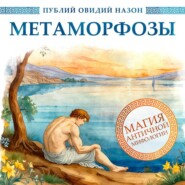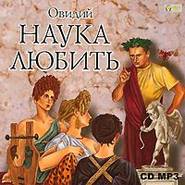По всем вопросам обращайтесь на: info@litportal.ru
(©) 2003-2024.
✖
Ars Amatoria; or, The Art Of Love
Настройки чтения
Размер шрифта
Высота строк
Поля
934 (return (#x2_x_2_i18))
[ Cynthius.—Ver. 240. See the Note to line 51, of the Epistle from Aenone to Paris.]
935 (return (#x2_x_2_i18))
[ Through the open roof.—Ver. 245. He gives a somewhat hazardous piece of advice here; as he instructs him to obtain admission by climbing up the wall, and getting in at the skylight, which extended over the 'atrium,' or 'court,' a room which occupied the middle of the house. The Roman houses had, in general, but one story over the ground-floor.]
936 (return (#x2_x_2_i18))
[ The high window.—Ver. 246. This passage may be illustrated by the Note to 1. 752: of Book xiv. of the Metamorphoses.]
937 (return (#x2_x_2_i19))
[ Day on which.—Ver. 257. He alluded to a festival celebrated by the servants, on the Caprotine Nones, the seventh of July, when they sacrificed to 'Juno Caprotina.' Macrobius says that the servants sacrificed to Juno under a wild fig-tree (called 'caprificus'), in memory of the service done by the female slaves, in exposing themselves to the lust ot the enemy, for the public welfare. The Gauls being driven from the city, the neighbouring nations chose the Dictator of the Fidenates for their chief, and, marching to Rome, demanded of the Senate, that if they would save their city, they should send out to them their wives and daughters The Senate, knowing their own weakness, were much perplexed, when a handmaid, named 'Tutela,' or 'Philotis,' offered, with some others, to go out to the enemy in disguise. Being, accordingly, dressed like free women, they repaired in tears to the camp of the enemy. They soon induced their new acquaintances to drink, on the pretence that they were bound to consider the day as a festival; and when intoxicated, a signal was giver, from a fig tree near, that the Romans should fall on them. The camp of the enemy was assailed, and most of them were slain. In return for their service, the female, slaves were made free, and received marriage portion? at the public expense. Another account, agreeing with the present passage, says, that the Gauls were the enemy who made the demand, and that Retana was the name of the female slave.]
938 (return (#x2_x_2_i19))
[ The lower classes.—Ver. 259. Witness his own appeals in the Amores to Napè, Cypassis. Bagous, and the porter.]
939 (return (#x2_x_2_i19))
[ In the Sacred Street.'—Ver. 266. Presents of game and trout very often follow a similar devolution at the present day.]
940 (return (#x2_x_2_i19))
[ Amaryllis was so fond of.—Ver. 267. He alludes to a line of Virgil, which, doubtless, was then well known to all persons of education. It occurs in the Eclogues: 'Castaneasque nuces, mea quas Amaryllis amabat.' 'Chesnuts, too, which my Amaryllis was so fond of.' In the next line, he hints that the damsels of his day were too greedy to be satisfied with chesnuts only.]
941 (return (#x2_x_2_i19))
[ Thrush and a pigeon.—Ver. 269. Probably live birds of the kind are here alluded to; Pliny tells us that they were trained to imitate the human voice. Thrushes were much esteemed as a delicacy for the table. They were sold tied up in clusters, in the shape of a crown.]
942 (return (#x2_x_2_i19))
[ By these means.—Ver. 271. He alludes to those who continued to slip into dead men's shoes, by making trifling presents of niceties. Juvenal inveighs against this practice.]
943 (return (#x2_x_2_i20))
[ Poetry does not.—Ver. 274. See the remarks of Dipsas in the Amores, Book i. El. viii. 1. 57.]
944 (return (#x2_x_2_i20))
[ Only rich.—Ver. 276. See the Amores, Book iii. El. ii.]
945 (return (#x2_x_2_i22))
[ Tyrian hue.—Ver. 297. See the Fasti, Book ii. 1. 107, and the Note.]
946 (return (#x2_x_2_i22))
[ Of Cos—Ver. 298. See the Epistles of Sabinus, Ep. iii. 1. 45, and the Note.]
947 (return (#x2_x_2_i22))
[ A dress of felt.—Ver. 300. 'Gausape,' 'gausapa,' or 'gausapum,' was a kind of thick woolly cloth, which had a long nap on one side. It was used to cover tables and beds, and as a protection against wind and rain. It was worn both by males and females, and came into use among the Romans about the time of Augustus.]
948 (return (#x2_x_2_i22))
[ You are setting me on fire.—Ver. 301. Burmanu deservedly censures the explanation of 'moves incendia,' given by Crispinus, the Delphin Editor, 'Vous mourrez de chaud,' 'You will die of heat,' applying the observation to the lady, and not, figuratively, to the feelings of her lover.]
949 (return (#x2_x_2_i22))
[ Her very embraces.—Ver. 308. The common reading of this line is clearly corrupt; probably the reading is the one here adopted, 'Et un dat, gaudia, voce proba.']
950 (return (#x2_x_2_i23))
[ What advice—Ver. 368. These attempts at argument are exhausted by Paris, in his Epistle to Helen.]
952 (return (#x2_x_2_i29))
[ Stinging-nettle.—Ver. 417. Pliny prescribes nettle-seed as a stimulating medicine, mixed with linseed, hyssop, and pepper.]
953 (return (#x2_x_2_i29))
[ White onion.—Ver. 421. The onions of Megara are praised by Cato, the agricultural writer.]
954 (return (#x2_x_2_i29))
[ Alcathous.—Ver. 421. See the Metamorphoses, Book vii. 1.]
955 (return (#x2_x_2_i33))
[ At first.—Ver. 467. See the beginning of the First Book of the Metamorphoses.]
956 (return (#x2_x_2_i34))
[ Unclean mate.—Ver. 486. He alludes to the strong smell of the he-goat.]
957 (return (#x2_x_2_i34))
[ Machaon.—Ver. 491. He was a famous physician, son of Æsculapius, and was slain in the Trojan war. See the Tristia, Book v. El. vi. 1. 11.]
958 (return (#x2_x_2_i35))
[ He came.—Ver. 496. 'Adest' seems a preferable reading to 'agit.']
959 (return (#x2_x_2_i35))
[ To know himself.—Ver. 600. 'Know thyself,' was a saying of Chilo, the Lacedaemonian, one of the wise men of Greece. This maxim was also inscribed in gold letters in the temple of Apollo at Delphi. 'Too much of nothing' was a second maxim there inscribed; and a third was, 'Misery is the consequence of debt and discord.']
[ Cynthius.—Ver. 240. See the Note to line 51, of the Epistle from Aenone to Paris.]
935 (return (#x2_x_2_i18))
[ Through the open roof.—Ver. 245. He gives a somewhat hazardous piece of advice here; as he instructs him to obtain admission by climbing up the wall, and getting in at the skylight, which extended over the 'atrium,' or 'court,' a room which occupied the middle of the house. The Roman houses had, in general, but one story over the ground-floor.]
936 (return (#x2_x_2_i18))
[ The high window.—Ver. 246. This passage may be illustrated by the Note to 1. 752: of Book xiv. of the Metamorphoses.]
937 (return (#x2_x_2_i19))
[ Day on which.—Ver. 257. He alluded to a festival celebrated by the servants, on the Caprotine Nones, the seventh of July, when they sacrificed to 'Juno Caprotina.' Macrobius says that the servants sacrificed to Juno under a wild fig-tree (called 'caprificus'), in memory of the service done by the female slaves, in exposing themselves to the lust ot the enemy, for the public welfare. The Gauls being driven from the city, the neighbouring nations chose the Dictator of the Fidenates for their chief, and, marching to Rome, demanded of the Senate, that if they would save their city, they should send out to them their wives and daughters The Senate, knowing their own weakness, were much perplexed, when a handmaid, named 'Tutela,' or 'Philotis,' offered, with some others, to go out to the enemy in disguise. Being, accordingly, dressed like free women, they repaired in tears to the camp of the enemy. They soon induced their new acquaintances to drink, on the pretence that they were bound to consider the day as a festival; and when intoxicated, a signal was giver, from a fig tree near, that the Romans should fall on them. The camp of the enemy was assailed, and most of them were slain. In return for their service, the female, slaves were made free, and received marriage portion? at the public expense. Another account, agreeing with the present passage, says, that the Gauls were the enemy who made the demand, and that Retana was the name of the female slave.]
938 (return (#x2_x_2_i19))
[ The lower classes.—Ver. 259. Witness his own appeals in the Amores to Napè, Cypassis. Bagous, and the porter.]
939 (return (#x2_x_2_i19))
[ In the Sacred Street.'—Ver. 266. Presents of game and trout very often follow a similar devolution at the present day.]
940 (return (#x2_x_2_i19))
[ Amaryllis was so fond of.—Ver. 267. He alludes to a line of Virgil, which, doubtless, was then well known to all persons of education. It occurs in the Eclogues: 'Castaneasque nuces, mea quas Amaryllis amabat.' 'Chesnuts, too, which my Amaryllis was so fond of.' In the next line, he hints that the damsels of his day were too greedy to be satisfied with chesnuts only.]
941 (return (#x2_x_2_i19))
[ Thrush and a pigeon.—Ver. 269. Probably live birds of the kind are here alluded to; Pliny tells us that they were trained to imitate the human voice. Thrushes were much esteemed as a delicacy for the table. They were sold tied up in clusters, in the shape of a crown.]
942 (return (#x2_x_2_i19))
[ By these means.—Ver. 271. He alludes to those who continued to slip into dead men's shoes, by making trifling presents of niceties. Juvenal inveighs against this practice.]
943 (return (#x2_x_2_i20))
[ Poetry does not.—Ver. 274. See the remarks of Dipsas in the Amores, Book i. El. viii. 1. 57.]
944 (return (#x2_x_2_i20))
[ Only rich.—Ver. 276. See the Amores, Book iii. El. ii.]
945 (return (#x2_x_2_i22))
[ Tyrian hue.—Ver. 297. See the Fasti, Book ii. 1. 107, and the Note.]
946 (return (#x2_x_2_i22))
[ Of Cos—Ver. 298. See the Epistles of Sabinus, Ep. iii. 1. 45, and the Note.]
947 (return (#x2_x_2_i22))
[ A dress of felt.—Ver. 300. 'Gausape,' 'gausapa,' or 'gausapum,' was a kind of thick woolly cloth, which had a long nap on one side. It was used to cover tables and beds, and as a protection against wind and rain. It was worn both by males and females, and came into use among the Romans about the time of Augustus.]
948 (return (#x2_x_2_i22))
[ You are setting me on fire.—Ver. 301. Burmanu deservedly censures the explanation of 'moves incendia,' given by Crispinus, the Delphin Editor, 'Vous mourrez de chaud,' 'You will die of heat,' applying the observation to the lady, and not, figuratively, to the feelings of her lover.]
949 (return (#x2_x_2_i22))
[ Her very embraces.—Ver. 308. The common reading of this line is clearly corrupt; probably the reading is the one here adopted, 'Et un dat, gaudia, voce proba.']
950 (return (#x2_x_2_i23))
[ What advice—Ver. 368. These attempts at argument are exhausted by Paris, in his Epistle to Helen.]
952 (return (#x2_x_2_i29))
[ Stinging-nettle.—Ver. 417. Pliny prescribes nettle-seed as a stimulating medicine, mixed with linseed, hyssop, and pepper.]
953 (return (#x2_x_2_i29))
[ White onion.—Ver. 421. The onions of Megara are praised by Cato, the agricultural writer.]
954 (return (#x2_x_2_i29))
[ Alcathous.—Ver. 421. See the Metamorphoses, Book vii. 1.]
955 (return (#x2_x_2_i33))
[ At first.—Ver. 467. See the beginning of the First Book of the Metamorphoses.]
956 (return (#x2_x_2_i34))
[ Unclean mate.—Ver. 486. He alludes to the strong smell of the he-goat.]
957 (return (#x2_x_2_i34))
[ Machaon.—Ver. 491. He was a famous physician, son of Æsculapius, and was slain in the Trojan war. See the Tristia, Book v. El. vi. 1. 11.]
958 (return (#x2_x_2_i35))
[ He came.—Ver. 496. 'Adest' seems a preferable reading to 'agit.']
959 (return (#x2_x_2_i35))
[ To know himself.—Ver. 600. 'Know thyself,' was a saying of Chilo, the Lacedaemonian, one of the wise men of Greece. This maxim was also inscribed in gold letters in the temple of Apollo at Delphi. 'Too much of nothing' was a second maxim there inscribed; and a third was, 'Misery is the consequence of debt and discord.']














